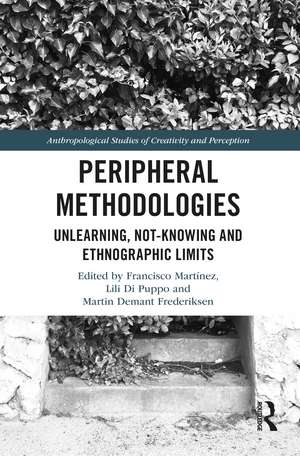Peripheral Methodologies: Unlearning, Not-knowing and Ethnographic Limits: Anthropological Studies of Creativity and Perception
Editat de Francisco Martínez, Lili Di Puppo, Martin Demant Frederiksenen Limba Engleză Paperback – 9 ian 2023
| Toate formatele și edițiile | Preț | Express |
|---|---|---|
| Paperback (1) | 362.64 lei 6-8 săpt. | |
| Taylor & Francis – 9 ian 2023 | 362.64 lei 6-8 săpt. | |
| Hardback (1) | 700.93 lei 6-8 săpt. | |
| Taylor & Francis – 28 apr 2021 | 700.93 lei 6-8 săpt. |
Preț: 362.64 lei
Nou
Puncte Express: 544
Preț estimativ în valută:
69.40€ • 72.19$ • 57.29£
69.40€ • 72.19$ • 57.29£
Carte tipărită la comandă
Livrare economică 14-28 aprilie
Preluare comenzi: 021 569.72.76
Specificații
ISBN-13: 9780367757625
ISBN-10: 0367757621
Pagini: 198
Ilustrații: 20
Dimensiuni: 156 x 234 x 15 mm
Greutate: 0.29 kg
Ediția:1
Editura: Taylor & Francis
Colecția Routledge
Seria Anthropological Studies of Creativity and Perception
Locul publicării:Oxford, United Kingdom
ISBN-10: 0367757621
Pagini: 198
Ilustrații: 20
Dimensiuni: 156 x 234 x 15 mm
Greutate: 0.29 kg
Ediția:1
Editura: Taylor & Francis
Colecția Routledge
Seria Anthropological Studies of Creativity and Perception
Locul publicării:Oxford, United Kingdom
Cuprins
Foreword, Paul Stoller (West Chester University, USA)IntroductionPart One: Suspension of Clarity1. Bad Analysis: Peripherality, Leaps of Faith, and Experiments in Anthropological Writing, Martin Demant Frederiksen (University of Oslo, Norway)2. Chemæra, Jason Pine (SUNY Purchase, USA)3. Being In The Periphery, Thinking From The Periphery, Kirsten Marie Raahauge (The Royal Danish Academy of Architecture, Design and Conservation, Denmark) Part Two: Staying and Attention 4. Words Flying Away: Sufism and Fieldwork in Russia, Lili di Puppo (HSE Moscow, Russia)5. Imagining Unknowing Knitting: On the Desired Absence of Knowledge, Lydia Arantes (UCL, UK)6. Peripheral Knowledge: Metis in Ceramic Production, Ewa Klekot (Warsaw, Poland)7. Wounded Margins: Vulnerability, the Conditions of Life, and the Ontology of the Body, Jan Hinrichsen (Tuebingen University, Germany)Part Three: Unlearning 8. Objects of Attention. Experiments with Knowledge in the State Museum, Francisco Martínez (University of Helsinki, Finland)9. ‘Good Enough’ Fieldwork, ‘Good Enough’ Parenting: Recognising Idioms in the Field, Melissa Nolas and Christos Varvantakis (Goldsmiths, University of London, UK)10. Isomorphic Articulations: ‘The Barely’ in Collaborative Film-work with Afghan-Danish Women, Karen Waltorp (Aarhus University, Denmark)Conclusion, Mikkel Rytter (Aarhus University, Denmark)BibliographyIndex
Notă biografică
Francisco Martínez is Associate Professor at the School of Humanities of Tallinn University, Estonia.
Lili Di Puppo is Assistant Professor of Sociology at the National Research University Higher School of Economics, Moscow, Russia.
Martin Demant Frederiksen is Associate Professor at the Department of Anthropology, Aarhus University, Denmark.
Lili Di Puppo is Assistant Professor of Sociology at the National Research University Higher School of Economics, Moscow, Russia.
Martin Demant Frederiksen is Associate Professor at the Department of Anthropology, Aarhus University, Denmark.
Recenzii
'In a time when positivist pretensions seek to present qualitative work as predictable and controllable, the great asset of this stimulating volume is how it embraces the unknown. Ethnographers almost naturally enter their field peripherally. Always coming from elsewhere, strangers in language and everyday habits, their strengths reside in their potential to keenly observe and, in painstakingly learning, to lay open what is but tacitly present: the multitude of practices that are at the heart of the human condition.'
– Regina F. Bendix, University of Göttingen, Germany
'Through sometimes tricky and often tense ethnographic chapters, the book helps to deepen and enliven debate on how to decenter customary epistemological, methodological and institutional practices, habits that have run their course, yet continue to resist unlearning. In these messy times, such efforts to cultivate attention are more necessary than ever, and I applaud the book’s ambition to pursue just that.'
– Eeva Berglund, Aalto University, Finland
– Regina F. Bendix, University of Göttingen, Germany
'Through sometimes tricky and often tense ethnographic chapters, the book helps to deepen and enliven debate on how to decenter customary epistemological, methodological and institutional practices, habits that have run their course, yet continue to resist unlearning. In these messy times, such efforts to cultivate attention are more necessary than ever, and I applaud the book’s ambition to pursue just that.'
– Eeva Berglund, Aalto University, Finland
Descriere
How does peripherality challenge methodology and theory-making? This book examines how the peripheral can be incorporated into ethnographic research, and reflects on what it means to be on the periphery—ontologically and epistemologically.











